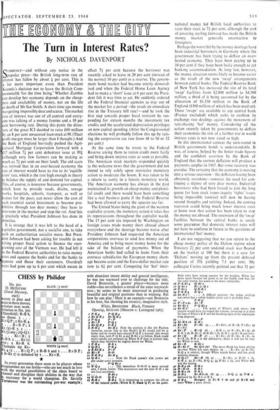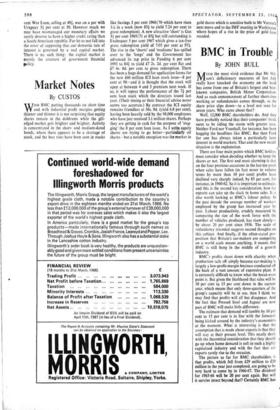The Turn in Interest Rates?
18aRIDAYily It
By NICHOLAS DAVENPORT
troDENLv—and without any notice in the apopular press—the British long-term rate of *nterest has fallen by about I- per cent. This is a far more important event than President aunda's decision not to leave the British Corn- onwealth 'for the time being.' Whether Zambia an develop her economy depends on the cheap- ess and availability of money, not on the life r death of Mr Ian Smith. A short time ago money as getting impossibly dear and scarce. The market ate of interest was out of all control and every- ne was talking of a money famine and a 10 per nt borrowing rate. During this panic the direc- ors of the great ICI decided to raise £60 million y an 8 per cent unsecured loan stock at 98. (Their rofit margin must be larger than I thought.) And e Bank of England hurriedly pushed the Agri- ultural Mortgage Corporation forward with a 17 million 7f per cent debenture issue at 994- although very few farmers can be making as uch as 71 per cent on their land). The old scare '.as revived that in an over-heated economy the ate of interest would have to rise to its 'equilib- urn' rate, which is the rate high enough in theory
o balance the supply of and demand for capital. his, of course, is nonsense because governments, hick have to provide roads, drains, sewage orks, hospitals, schools, transport, as well as ouses for the poor, can never allow the cost of ch essential social investment to become pro- ibitive through too dear money; they have to ntervene in the market and stop the rot. And this s precisely what President Johnson has done in merica.
It is strange that it was left to the head of a apitalist government, not a socialist one, to take uch an authoritarian socialist move. But Presi- ent Johnson had been asking for trouble in not aking proper fiscal action to finance the ever- rowing cost of the Vietnam war. He had left it
o the Federal Reserve authorities to raise money tes and squeeze the banks and for the banks to queeze and fleece their customers. Overdraft ates had gone up to 6 per cent which meant in effect 7+ per cent because the borrower was recently asked to leave in 20 per cent (instead of the normal 10 per cent) as a reserve. The govern- ment bond market had become utterly demoral- ised and when the Federal Home Loan Agency had to make a 'short' issue at 6 per cent the Presi- dent felt it was time to act. He suddenly ordered all the Federal financial agencies to stay out of the market for a period—the result an immediate rise in the Treasury bill rate!—and he took the first step towards proper fiscal restraint by sus- pending for sixteen months the investment tax credits and the accelerated depreciation privileges on new capital spending. (After the Congressional elections he will probably follow this up by rais- ing the corporation tax rate from 48 to 50 or 52 per cent.) At the same time he wrote to the Federal Reserve asking them to ration credit more fairly and bring down interest rates as soon as possible. The American stock markets responded quickly to the welcome news that the government did not intend to rely solely upon restrictive monetary action to moderate the boom. It was taken to be a return to sanity in a lunatic monetary world. The American economy has always in the past maintained its growth on cheap money and plenti- ful credit and there would have been something like a real business panic if the Federal Reserve had been allowed to carry the squeeze too far.
The United States being the giant of the western capitalist system, the monetary action it takes has its repercussions throughout the capitalist world. The 15 per cent tax imposed by Washington on foreign issues made money short abroad almost everywhere and the shortage became worse after President Johnson had requested the American corporations overseas to send less money out of America and to bring more money home for the sake of the balance of payments. When the American banks had called in loans from their overseas subsidiaries the European money short- age became acute and the Euro-dollar market rate rose to 61 per cent. Competing for 'hot' inter-
national money led British local authorities to raise their rates to 7/ per cent, although the cost of covering sterling forward has made the British money market generally unattractive to foreigners.
Perhaps the worst hit by the money shortage have been industrial borrowers in Germany where the government has been trying to deflate an over- heated economy. They have been paying up to 10 per cent if they have been lucky enough to get banking accommodation. At long last, however, the money situation seems likely to become easier as the result of the new 'swap' arrangements between central banks. The Federal Reserve Bank of New York has increased the size of its total 'swap' facilities from $2,800 million to $4,500 million, a third of it being accounted for by the allocatioh of $1,350 million to the Bank of England ($300 million of which has been used up). These 'swaps' are available to any central bank (France excluded) which seeks to cushion its exchange rate dealings against the movement of rate-chasing 'hot' money. Considering all the action recently taken by governments to deflate their economies the risk of a further rise in world interest rates is not now rated so high.
In this international context the turn-round in British government bonds is understandable. It was, of course, helped by the better trade figures and the confident assertion by the Bank of England that the current deflation will produce a payments surplus in 1967. But some recovery was overdue. The certainty that the economy is moving into a serious recession—the deflation having been obviously overdone—removes the need for con- tinuing a regime of very dear money. Industrial borrowers who had been forced to join the long queue for loan stock issues (equity 'rights' issues being impossible taxwise) will now be having second thoughts and retiring. Indeed, the coming recession could bring much lower interest rates at home now that action has been taken to stop the money rot abroad. The extension of the 'swap' facilities between the central banks is surely some guarantee that domestic interest rates will not have to conform in future to the gyrations of international 'hot' money.
I am not suggesting that we can return to the cheap money policy of the Dalton regime when Treasury 21 per cent undated stock was floated on the market at 100 but there is a case for `Daltons' moving up from the present debased position of 35i yielding 7.1 per cent. My colleague Custos recently pointed out that 34 per cent War Loan, selling at 491, was on a par with Uruguay 31 per cent at 50. However much we may have mismanaged our monetary affairs we surely deserve to have a higher credit rating than a South American republic. For let us not fall into the error of supposing that our domestic rate of interest is governed by a real capital market. There is no such thing : the capital market is merely the creature of government financial policy.



































 Previous page
Previous page